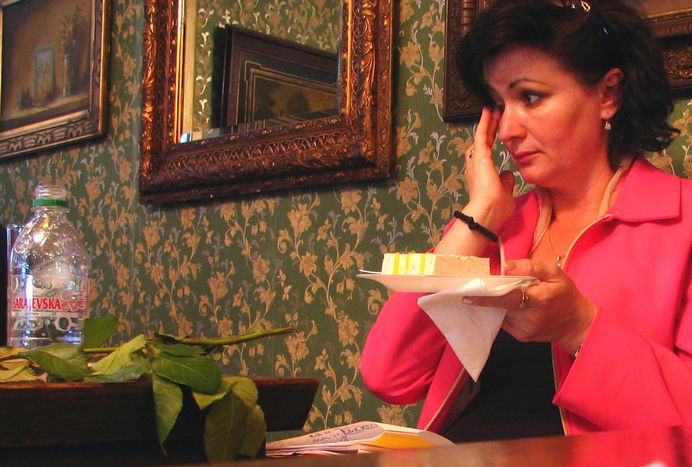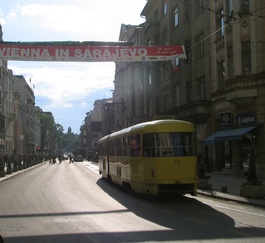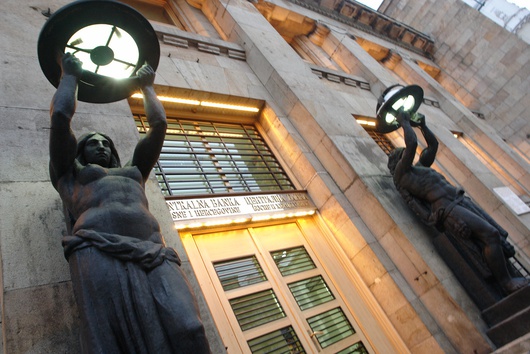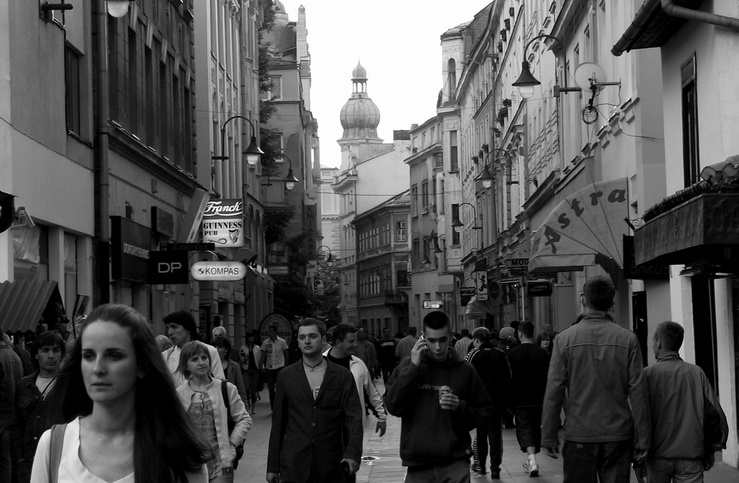
Sarajevo: ethnocracy wins the October elections
Published on
Translation by:
Sarah GrayResults won’t be known until 4 November, after 54.48% of the population voted a month earlier. The country’s tripartite presidency will be shared by Nebojša Radmanović, Haris Silajdžić and Željko Komšić
 You have to wait until late afternoon to notice the UN offices, along Sarajevo’s main street Ulica Maršala Tita. And even when the rays of the setting sun strike the huge glass building your gaze is drawn to the Centralna Banka Bosne i Hercegovine, housed in a fascist-era hospital, or to the nearby Fima Bank.
You have to wait until late afternoon to notice the UN offices, along Sarajevo’s main street Ulica Maršala Tita. And even when the rays of the setting sun strike the huge glass building your gaze is drawn to the Centralna Banka Bosne i Hercegovine, housed in a fascist-era hospital, or to the nearby Fima Bank.
Vote for ethnic belonging
The national press recently announced a reduction in the number of European Union Police Mission (EUPM) troops from last year’s level of 7200 to 1140, which is perhaps why it is now rare to see a man in uniform on capital’s streets. The remaining units will become a European Police Force which, along with local forces, will deal with new forms of criminal activity emerging in a country where there is no money and no investment, yet more banks than there are mosques. Branches of Italian banks Unicredit and Intesa San Paolo are prominent here. The local press reports investigations and arrests, mostly for bribery. The latest public figure to be accused was a well-known army general.
 For the past month, the main street, named after Yugoslav dictator Tito, has been covered in political posters. The politicians’ faces look like characters from TV soaps, photographed in half-profile with coloured backgrounds and slogans underneath. Eighty political parties took part in 5 October’s local elections, with even the smallest ethnic minorities being represented. But only 55% of people voted, mostly from ‘outside Sarajevo’. Comments made on TV and a quick read of the posters tell us why: ‘The electoral campaign was too concentrated on national issues, rather than matters relating to local government,’ says Jasmine, a young arts student, as she runs to university for a lecture. ‘I didn’t vote,’ she adds.
For the past month, the main street, named after Yugoslav dictator Tito, has been covered in political posters. The politicians’ faces look like characters from TV soaps, photographed in half-profile with coloured backgrounds and slogans underneath. Eighty political parties took part in 5 October’s local elections, with even the smallest ethnic minorities being represented. But only 55% of people voted, mostly from ‘outside Sarajevo’. Comments made on TV and a quick read of the posters tell us why: ‘The electoral campaign was too concentrated on national issues, rather than matters relating to local government,’ says Jasmine, a young arts student, as she runs to university for a lecture. ‘I didn’t vote,’ she adds.
Public opinion in favour of EU membership
Law requires that the election results are not made official until 4 November. However we know that 32 mayors will be from the SNDS (union of independent social democrats, the prime minister’s party), and 28 from the SDA (democratic action party, nationalist), a bad result for the SDP, the socialist party.
As a tourist, the only way to remind yourself that there was a war here is to stumble into one of the holes left by shells
At rush hour Ferhadija, a wealthy street in the city centre, is crowded with students leaving school and businessmen. As a tourist, the only way to remind yourself that there was a war here is to stumble into one of the holes left by shells. You may lower your eyes, ask why these holes have been covered in red chalk, and wait for someone to explain the great lengths that Bosniaks go to in order to keep these memories alive. This all takes place as you walk slowly along, dodging people who stop to look in shop windows at international designer labels. In one of the city’s stylish bars, Sjnan, a Slav linguist, reads the political section of a daily paper: The Muslims of the SDA and the social democrats of the SNDS have won. It’s no surprise. I voted socialist,’ he tells us, sipping a Turkish coffee. ‘It’s called Kahvc. The hv is pronounced ff. As far away as Cairo I’ve heard kahvc, used to mean 'come here'. In fact, the word 'coffee', so frequently used in European languages, is of Middle-Eastern origin,’ he explains, dropping several sugar cubes into his drink.

The preference for drinking coffee and voting for Muslims proves we are in the Turkish district, at the end of Ferhadija. Girls buy clothes along the main street, then go to the market around the Gazi Husrev Beg mosque for gold jewellery and scarves. Everyone is allowed inside the religious building, even women without headscarves, as long as they leave their shoes outside. ‘We converted to Islam after the war because the Mujahideen were the first, if not the only, people to help us against the Serbs. But we are not fundamentalists or terrorists. In fact, Bosnia is a very tolerant place,’ Haris tells us, also admitted that he voted for the SDA. ‘Did you notice the EU stars on the posters?’ Marko, an Italian-Bosniak, asks. Here all parties are nationalist and pro-European at the same time.’ They are nationalistic in different ways (depending on whether they are Bosniak, Serb or Croat) but pro-European in the same way.
There are 180 ministers and three parliaments: bureaucracy needs to slim down
The Italian ambassador in Bosnia Herzegovina, Alessandro Fallavollita, tells us about the Slavic countries with the EU. ‘Bosnia wants to join the European community. They are working towards it, 90% of public opinion is in favour of it. The problem is that the political situation here is very complicated, despite the fact that the state was created by the Dayton peace accords in 1995 (which ended the war). There are 180 ministers and three parliaments; it may be a federal republic, but it’s too much to manage, the bureaucracy needs to be slimmed down. The ruling class must change completely: in order to overcome any residual hostility the country needs young people in government, not people who used to be enemies. Ethnocracy must end: Bosniaks who protect their own independence, Serbs who want to be united and Croats who want to be better represented.’
The ambassador is speaking after a poetry reading, seemingly unaware of the party atmosphere around him. ‘Nationalism is a problem. An agreement of socialisation and stabilisation was signed on 17 June this year, but there is much more work to do in order to gain entry to the EU: the Balkans are at the heart of Europe and Europe must welcome in Balkans into the heart of the Union.’
Monday, after the elections on 6 October. A few hours ago CNN inform us of the ‘financial difficulties’ at Unicredit: in front of a branch of the Italian bank in central Sarajevo, Socialist party banners have been added to those of the bank. It’s hard to make out which is which (they both use red on a white background and black letters): is this a strange omen, or perhaps the wind criticising the situation?
Translated from Elezioni in Bosnia-Erezegovina: ha vinto l’appartenenza etnica



